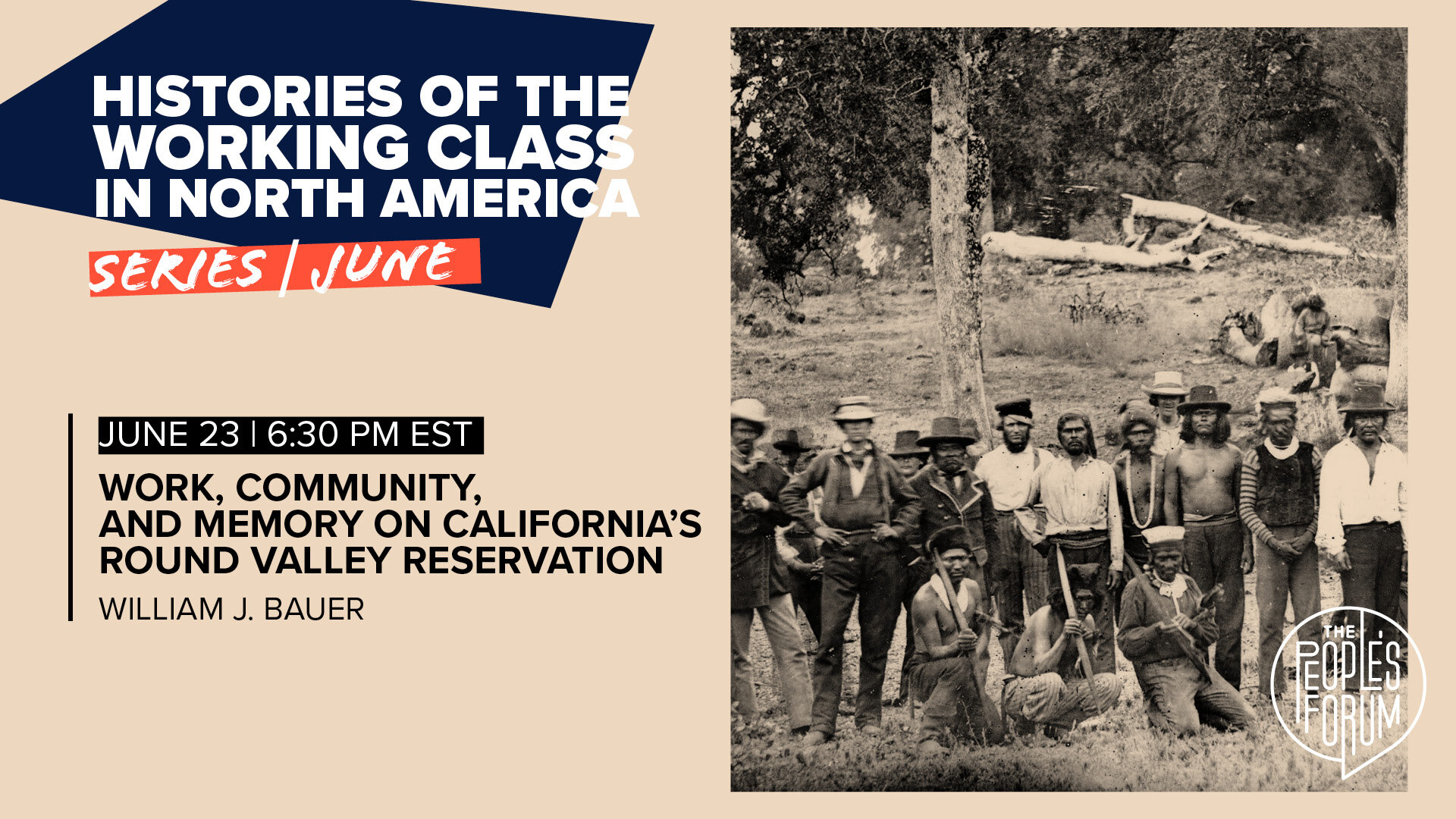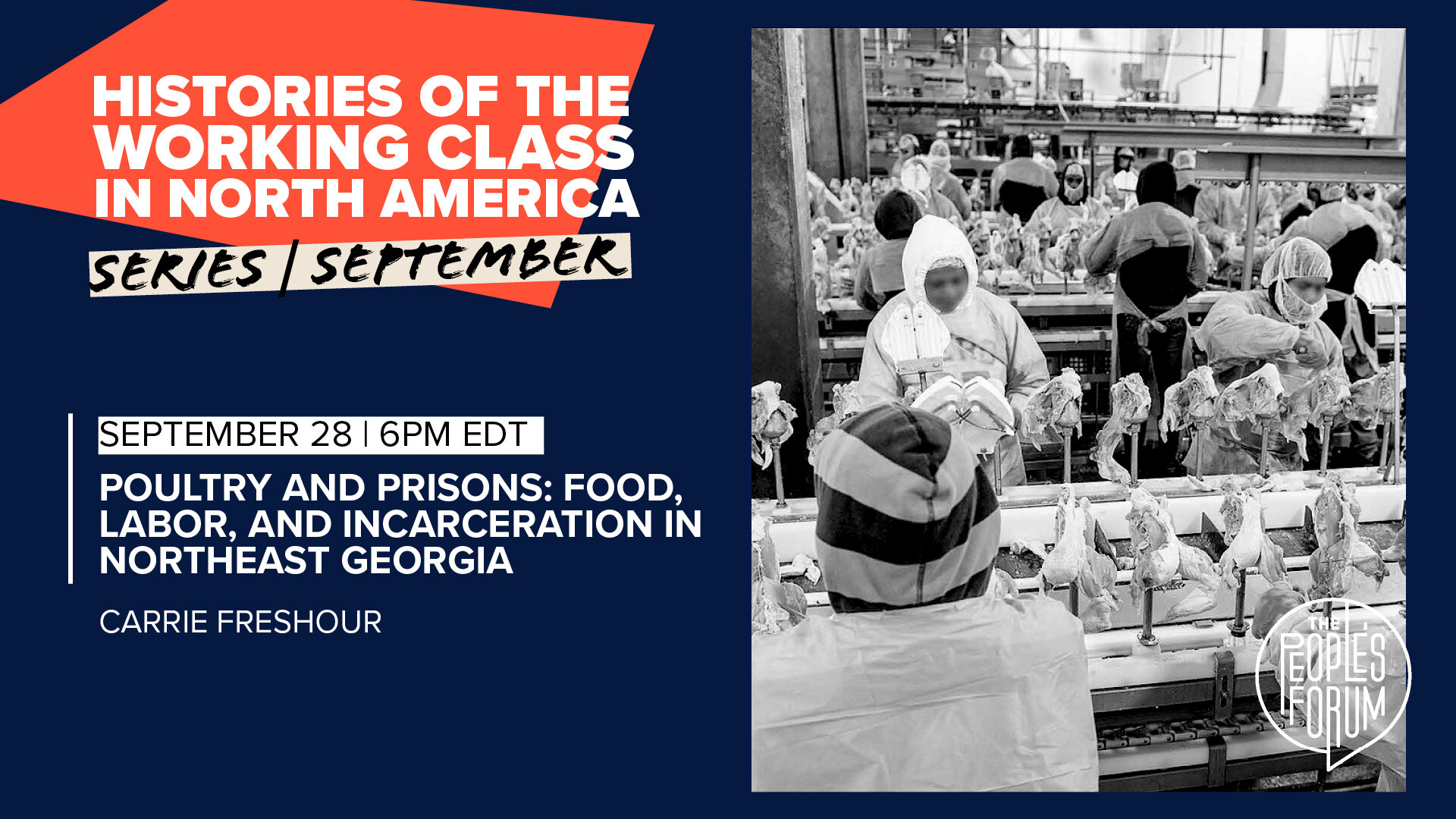
Histories of the Working Class in North America
Histories of the Working Class in North America is a space for popular education that brings researchers and scholars into conversation with organizers, students, and teachers rooted in the contemporary working class. Hosted by The People’s Forum, this series is driven by a commitment to better understand the history of working class life and struggle in order to learn lessons that can be applied in the class struggle today.
The majority of us, no matter our level of education, have been taught to see history from the perspective of our exploiters, obscuring the histories of working class struggle in order to forestall future victories. This has been accomplished, in part, by an enforced divide between intellectuals working in academia, and intellectuals committed to spaces of political struggle. We invite emerging and established scholars of working histories in a range of economic sectors, geographic, and social locations, to speak to our audience, particularly young people engaged in working class and anti-racist struggles. We intend to build a collective conversation and a practice of sustained study to strengthen anti-racist, feminist, and working class struggles today. In order to know where we are going, we must study where we have come from!
From May - September 2021, we held a series of public, monthly talks with a historian to delve deeper into our history.
See the full YouTube playlist of lectures here.
Women’s Organizing in the Appalachia South
RECORDING | READING* | DISCUSSION QUESTIONS
To Live Here, You Have to Fight: How Women Led Appalachian Movements for Social Justice by Jessica Wilkerson
Dr. Wilkerson specializes in the histories of Appalachia and the South, modern America, women and gender, and labor and the working class. Her first book, To Live Here, You Have to Fight: How Women Led Appalachian Movements for Social Justice (University of Illinois Press, 2019), traces the alliances forged and the grassroots movements led by women in the Appalachian South in the 1960s and 1970s. She shows how white Appalachian women acted as leaders and soldiers in a grassroots war on poverty–shaping and sustaining programs, engaging in ideological debates, offering fresh visions of democratic participation, and facing personal political struggles. Their insistence that caregiving was valuable labor clashed with entrenched attitudes and rising criticisms of welfare. Their persistence, meanwhile, brought them into coalitions with Black women, disabled miners, and others to fight for causes that ranged from poor people’s rights to community health to unionization.
*we have received permission from the author to share this article.
Work, Community, and Memory on California’s Round Valley Reservation
RECORDING | FIND IT IN A LIBRARY | DISCUSSION QUESTIONS
We Were All Like Migrant Workers Here: Work, Community, and Memory on California's Round Valley Reservation, 1850-1941 by William J. Bauer
William (Willy) Bauer is a professor of history and a citizen of the Round Valley Reservation in northern California. He received his B.A. from the University of Notre Dame and his M.A. and Ph.D. from the University of Oklahoma. Dr. Bauer offers classes on American Indian history, the history of American Indian gaming and the American West. He is also UNLV’s faculty liaison to the Newberry Library’s Consortium on American Indian Studies.
Bauer is currently writing a history of California Indians and working on a family biography, based on the life of his great-grandfather.
Dockworker Power: Race and Internationalism
RECORDING | FIND IT IN A LIBRARY | DISCUSSION QUESTIONS
Dockworker Power: Race and Activism in Durban and the San Francisco Bay Area by Peter Cole
Dr. Peter Cole is a historian with teaching and research interests in the history of the United States, South Africa, along with a commitment to public art + history. Cole teaches the Department’s courses on African American History, Urban America, the Gilded Age and Progressive Era, and public history as well as the second half of the US survey, graduate seminars , special topics courses on South Africa, social movements, labor and working-class history, comparative history, as well as various historical methods courses.
Prof. Cole researches the history of social movements, especially how workers and labor unions organize in ethnically and racially diverse societies. He also maintains scholarly interests in the history of African Americans, deindustrialization, South Africa, cities, technology, popular culture, historical memory, and the maritime world. He is a Research Associate in the Society, Work and Development Institute (SWOP) at the University of the Witwatersrand in Johannesburg, South Africa.
Race, Labor, and Coalition Building in Racine, Wisconsin
RECORDING | READING* | DISCUSSION QUESTIONS
“Sustaining Labor Politics in Hard Times: Race, Labor, and Coalition Building in Racine, Wisconsin” by Naomi R. Williams
Professor Naomi R Williams received a PhD from the History Department at the University of Wisconsin-Madison. Their primary research interests include labor and working-class history, urban history and politics, gender and women, race and politics, and more broadly, social and economic movements of working people. Naomi’s primary focus is on late-capitalism at the end of the 20th century and workers’ role in shaping U.S. political economy. Currently, they are revising a book manuscript, tentatively titled “Workers United: Race, Labor, and Coalition Building in Deindustrialized America,” on the transformation of class identity and politics in the second half of the twentieth century.
*we have received permission from the author and publication to share this article
Poultry and Prisons: Food, Labor, and Incarceration in Northeast Georgia
RECORDING | READING | DISCUSSION QUESTIONS
“Poultry and Prisons: Toward a General Strike for Abolition” by Carrie Freshour
Carrie Freshour is a Southerner, abolitionist, and assistant professor of geography at the University of Washington. Her work focuses on low-wage food and agricultural labor in the U.S. South, racial capitalism, carceral geographies, and the Black radical tradition. Freshour is currently finalizing her book project, Making Life Work, which centers the experiences of Black women, their families, and broader communities in Northeast Georgia who remain the basis for the global production of cheap chicken. She teaches courses on qualitative methods, food and agriculture, racial capitalism, and the radical geographies of the PNW. She is a part of several research and organizing collectives including The People’s Geography of Seattle, the Antipod Sound Collective, Study and Struggle, and abolitionist organizing in WA state.
What other topics of working class history around North America and the US would you like to learn more deeply about?
Email education@peoplesforum.org with your thoughts!





